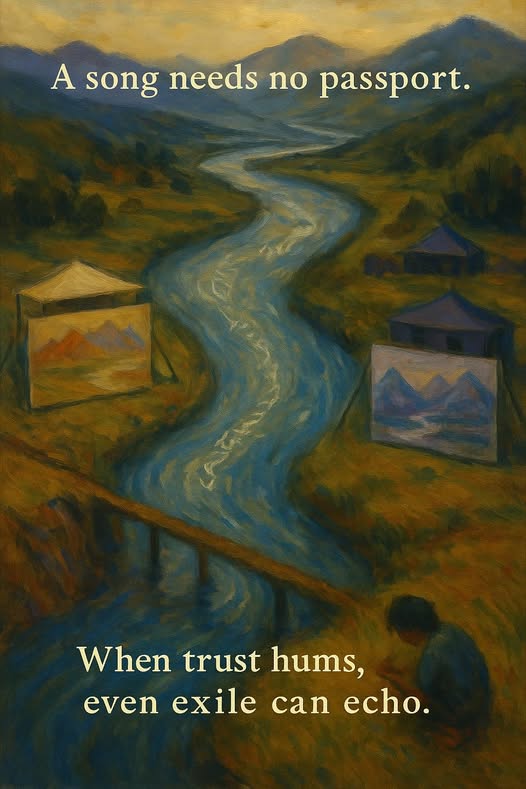
June 19, 2026 — Morning Mist at the Line
The bridge wasn’t marked on most maps. It arched humbly across a narrow stretch of the Jhelum, not far from Uri — a pedestrian crossing long closed to the world but occasionally whispered about in quiet diplomacy. On the morning of June 19, the Circle stood at its edge, canvas tubes strapped to their backs, the Quiet Box secured in a canvas bag. The mist moved like breath across the water, and somewhere in the far trees, a koel called twice and fell silent.
A soldier on the Indian side checked a letter — the one signed by Culture Affairs and stamped by the UN Liaison. He radioed across the fog. Static, then a reply. The soldier gave a small nod. “You have two days. Stay near your host.”
No camera crews. No flags. Just footsteps and canvas.
The Crossing
They moved one by one — Jaden first, then Aisha, her fingers clutched around a sketch scroll. Sofia followed, holding the copy of Neelam’s drawings. Mina paused halfway, looking down at the river — a ribbon of motion undisturbed by borders.
Emil came last, the ledger clutched under his arm. As he stepped off the bridge, the pages fluttered slightly. He imagined the wind turning them toward something unseen but waiting.
Muzaffarabad — Afternoon Light
They were received not with ceremony but silence.
Zohair’s home sat at the edge of a ridge, its wooden shutters worn smooth by decades of wind. A boy opened the door and gestured wordlessly inside. The poet sat cross-legged by a low table, tuning a rabab. He didn’t rise but looked up as the Circle entered, his eyes still, unreadable.
“You’ve brought the song back,” he said at last. “Why?”
Priya unfolded the consent letter and set it beside him. “Not to claim it. To let it carry — between the mirrors.”
Zohair nodded once, slowly. “Mirrors can also distort. But rivers don’t lie.”
Aisha unrolled the twin mural sketches, laying them across the floor. He studied the lines for a long moment — the Srinagar sky, the lost orchards of Jammu, the same silver river etched on both.
“This is what the song was meant for,” he murmured. “To remember — not to return.”
The Studio of Winds
Zohair led them to the back of the house, where an old storeroom had been cleared. Ropes stretched from beams like stringed instruments. Dozens of written verses hung from clothespins, dancing gently in the air.
Mina added a new slip to the line: Where water listens, we must whisper carefully.
The Quiet Box was set down on a low bench. One child, then another, added slips in Urdu and Kashmiri:
— My mother says our home had a cherry tree, but I’ve never seen one.
— I want to draw the river as my brother crossed it.
Sofia adjusted the fabric, placing the Muzaffarabad canvas alongside the one from Jammu. “Two lungs,” she said. “One breath.”
Zohair picked up the rabab and played a single phrase — slow, steady. Then he began to sing.
Refrain: River, keep the names / River, keep them safe.
Children echoed the last line like a lullaby. Even Jaden’s rig of canopy mics and recording gear went untouched. The moment didn’t want to be captured. Only carried.
Ledger Entry — The Song Across the River
Date: June 19, 2026
Symptom: Division’s persistence requires re-humanizing stories from both sides of exile; creative echo forms bridge.
Disease — The Four Absences (Across Borders):
Absence 1 (Exclusion): Poetry and art trapped by geography; creators disconnected from listeners.
Absence 2 (Vengeance): Memory re-used as weapon; songs politicized.
Absence 3 (Dehumanization): Borders obscure lived identities; artists seen as threats or pawns.
Absence 4 (Unheard Cry): Emotional truths left out of official dialogue; grief remains unsung.
Investigator’s Response:
Sought poetic permission; aligned mural memory with musical origin; preserved neutrality of art while amplifying unheard voices.
Outcome:
Song becomes shared asset; emotional trust exchanged; cultural bridge laid with consent and reverence.
Note:
The river didn’t recognize our passports — only the melody we carried.
That night, the Circle camped near the riverbank, just on the edge of the crossing. Emil watched the stars emerge, one by one, and wrote in his ledger:
Songs are vessels. Some carry grief. Some carry return. This one carried us.

